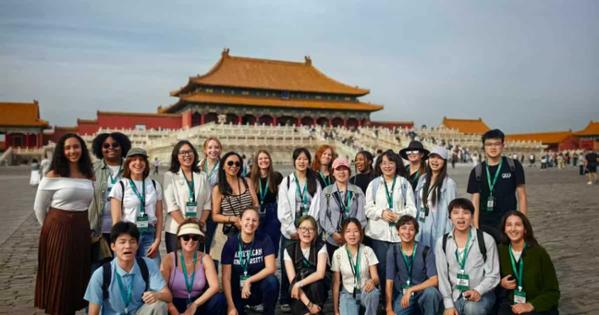Global Heritage Forum 2025: A Student’s Perspective from Beijing

In September, 10 American University students—eight from the School of International Service (SIS), one from the School of Communication (SOC), and one from the School of Public Affairs (SPA)—traveled to Beijing, China, to participate in the Global Heritage Forum, an international initiative hosted by the Ng Teng Fong Foundation to promote cross-cultural dialogue and cooperation in the protection of global heritage.
The AU group, accompanied by Dr. Tara Pylate from the College of Arts and Sciences' Department of World Languages and Cultures, joined students, faculty, and staff from universities across the United States and the United Kingdom. Over the course of four days, they took part in activities that highlighted the intersections of culture, history, and international collaboration.
Throughout the forum, participants visited some of Beijing’s most iconic heritage sites, gaining firsthand insight into China’s efforts to preserve its cultural legacy. They also attended lectures and discussions with leading scholars and practitioners in the field and took part in dialogue with Chinese peers from the University of International Business and Economics in Beijing. For many participants, the experience offered a rare opportunity to connect academic study with global engagement.
The Global Heritage Forum serves as a reminder of the power of international collaboration in addressing shared global challenges and of the vital role students play in building bridges across cultures.
Reflections from Beijing: Kevin Moore, SIS/MA ’26
During the last week of September 2025, I had the incredible opportunity to represent American University at the Global Heritage Forum (GHF) in Beijing, a fully funded initiative promoting international collaboration on cultural preservation. As a researcher focused on the Asia-Pacific region and a Mandarin language learner, this was an especially meaningful experience, as it marked not only my first visit to China but also my first time setting foot on the Asian continent.
As I prepare to write my substantial research paper to conclude my master’s studies, I have been reflecting deeply on my positionality as a researcher and how I fit into the broader narrative of diplomatic practices in the Asia-Pacific region. This trip offered a valuable opportunity to ground that reflection in lived experience.
Beyond putting my Mandarin skills to the test, the forum’s theme, “Global Collaboration: Cultural Conservation,” aligned perfectly with my academic and personal passions. The event centered on strengthening international cooperation and promoting mutual understanding to support the sustainable development and protection of world and cultural heritage. As a student of intercultural and international communication, I am particularly drawn to how collaboration across borders can safeguard languages, historical sites, and traditional practices. This experience felt like a pivotal step forward in my evolving career path.
With the support of the Ng Teng Fong Charitable Foundation, I joined nine other American University students and peers from several other US and UK institutions in exploring how global cooperation is essential to preserving heritage amid rapid modernization and globalization. Throughout the conference, we gained insight from distinguished experts, including Bénédicte de Montlaur (World Monuments Fund), Siddharth Chatterjee (United Nations), Professor Marc Norman (NYU), and Professor Martin Dixon (University of Cambridge), among others.
One message that resonated deeply with me came from Professor Norman, who emphasized the power of “telling stories to gain support for preservation.” His reflections on balancing real estate development with cultural conservation in New York City reminded me that storytelling is not just a communication strategy, it is a vital tool for sustaining cultural identity. This is an idea I plan to carry forward in my own work.
Beyond the forum sessions, our group explored Beijing’s extraordinary UNESCO World Heritage Sites, from the Central Axis and the Forbidden City to the Great Wall and the Summer Palace. Standing atop the Great Wall and strolling through the Summer Palace were surreal, almost transportive experiences—moments when history seemed to come alive around us.
One of the most memorable parts of the experience was the warmth and generosity we received—from sharing incredible meals featuring traditional Chinese dishes like Peking Duck to mesmerizing cultural performances that offered a deeper glimpse into the heart of Chinese traditions. Most meaningful, however, was the opportunity to build genuine, lasting connections with Chinese students from Beijing's University of International Business and Economics through thoughtful linguistic and cultural exchange. These interactions not only broadened our understanding but also left a lasting impact on how we see the world.
The week flew by far too quickly, but it was truly the trip of a lifetime—one that deepened my academic perspective, enriched my global understanding, and reaffirmed my passion for cultural preservation and international collaboration.